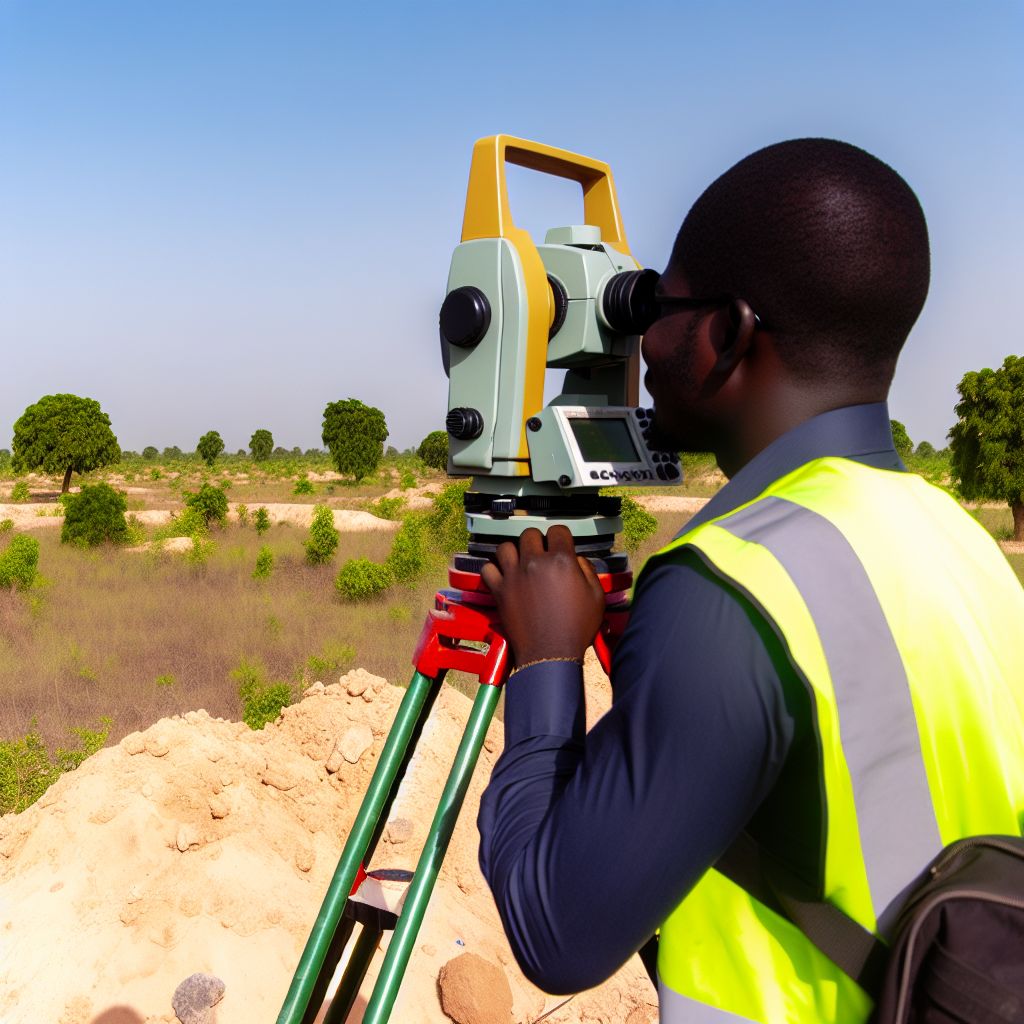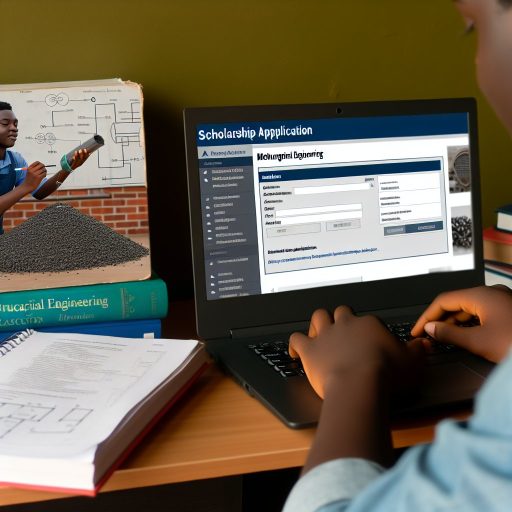Introduction
Surveying is the practice of determining the relative positions of points on the Earth’s surface.
It plays a crucial role in industries such as construction, mining, land development, and infrastructure.
In Nigeria, surveying education is structured to equip students with the necessary skills.
Degrees Offered in Surveying Education
– Bachelor’s degree in surveying
– Master’s degree in surveying
– Doctorate degrees in surveying
– Importance of advanced degrees in career advancement
Bachelor’s Degree in Surveying
A Bachelor’s degree in surveying is typically a 4-year program.
This program provides students with a solid foundation in surveying principles and techniques.
Students in this program will take courses in land surveying, geomatics, geodesy, and GIS, among others.
Upon completion of the program, graduates can pursue careers as land surveyors, GIS specialists, or geomatics engineers.
Master’s Degree in Surveying
A Master’s degree in surveying is a graduate-level program.
It typically takes 1-2 years to complete.
This degree provides students with advanced knowledge and skills in surveying.
Graduates can specialize in areas such as land development or geospatial analysis.
Those with a Master’s degree in surveying often have more job opportunities and higher earning potential.
Doctorate Degrees in Surveying
Doctorate degrees in surveying are the highest level of education in this field.
These programs are typically research-focused.
Students conduct original research in surveying.
Individuals with a Ph.D. in surveying can pursue careers in academia, research institutions, or consulting firms.
Importance of Advanced Degrees in Career Advancement
Having an advanced degree in surveying can significantly boost one’s career prospects.
Employers often prefer candidates with a Master’s or Ph.D. degree for higher-level positions.
Advanced degrees also provide opportunities for networking and research collaboration.
Pursuing advanced degrees in surveying can open doors to exciting career paths.
It can also contribute to the growth and innovation of the field.
Overview of Diploma Programs in Surveying
Diploma programs in surveying provide foundational knowledge and skills for aspiring surveyors.
These programs typically cover topics such as land surveying, geospatial technology, and surveying techniques.
Students can expect a mix of classroom instruction, fieldwork, and hands-on training in these programs.
Importance of Certifications in Surveying
Certifications in surveying demonstrate a surveyor’s expertise and commitment to professional standards.
Having a certification can enhance job prospects, credibility, and earning potential in the field.
Employers often prefer candidates with certifications as they indicate a higher level of competency and professionalism.
Different Certification Programs Available in Nigeria
In Nigeria, there are several certification programs available for surveyors, including the Registered Surveyor (LSN), CISCO certifications, and GIS certifications.
These certifications cover a range of specializations within the field of surveying, such as cadastral surveying, geospatial analysis, and GIS mapping.
Surveyors can choose the certification program that aligns with their career goals and interests.
Benefits of Obtaining Diplomas and Certifications in Surveying
- Enhanced skills and knowledge: Diplomas and certifications help surveyors develop specialized skills and knowledge that are crucial for success in the field.
- Increased job opportunities: Employers often prefer candidates with formal education and certifications, leading to more job opportunities and career advancement.
- Professional recognition: Diplomas and certifications serve as a mark of professionalism and competence, garnering respect from peers and clients.
- Higher earning potential: Certified surveyors typically earn higher salaries due to their advanced skills and expertise in the field.
- Networking opportunities: Diploma and certification programs provide surveyors with networking opportunities to connect with industry professionals and expand their professional circles.
Explore Further: Future Trends in Land Surveying and Geoinformatics
Core Courses in Surveying Curriculum
Core courses in surveying education typically cover topics such as geodesy, surveying instrumentation, boundary surveying, topographic mapping, and land development planning.
Students will also learn about legal principles, land use planning, spatial data analysis, and geographic information systems (GIS).
These courses provide a strong foundation in the fundamentals of surveying and prepare students for more specialized studies.
Specialized Courses in Surveying Education
Specialized courses in surveying education allow students to focus on specific areas of interest within the field.
Options may include courses in hydrographic surveying, photogrammetry, remote sensing, construction surveying, and cadastral surveying.
Transform Your Career with Expert Guidance
Get personalized mentorship consulting that’s tailored to your unique path. Our expert advice is actionable and exclusive.
Get StartedThese courses deepen students’ knowledge and skills in their chosen specialty and help them become experts in that area.
Practical Training and Fieldwork Requirements
Surveying education often includes practical training and fieldwork requirements to give students hands-on experience.
Students may participate in internships, co-op programs, or practicums to apply their classroom knowledge in real-world settings.
This practical training is crucial for students to develop technical skills, problem-solving abilities, and professional judgment.
Importance of Hands-On Experience in Surveying Education
Hands-on experience in surveying education is essential for students to become competent surveyors.
It allows students to apply theoretical concepts to practical situations, enhancing their understanding of complex surveying techniques.
Hands-on experience also helps students develop important soft skills such as communication, teamwork, and project management.
Discover More: Land Surveying and Environmental Management
Challenges Facing Surveying Education in Nigeria
Surveying education in Nigeria faces several challenges that hinder its growth and development.
These challenges impact the quality of education and the preparedness of students entering the workforce.
Some of the key challenges include:
-
The lack of modern equipment and technology in surveying education institutions in Nigeria hampers the practical training of students.
Without access to up-to-date tools and technology, students may graduate without the necessary skills to excel in the field.
-
Funding is a critical issue for surveying education in Nigeria.
Insufficient resources limit the ability of institutions to improve infrastructure, update curricula, and provide scholarships or financial aid to students in need.
-
The shortage of qualified instructors in surveying education institutions is a significant challenge.
Skilled and experienced faculty members are essential for providing students with the knowledge and guidance they need to succeed in their studies and future careers.
-
The rapidly evolving nature of the surveying industry necessitates regular updates to the curriculum to align with industry demands.
Outdated or irrelevant course content can leave students ill-prepared for the modern workplace.
Addressing these challenges is crucial for the advancement of surveying education in Nigeria.
By investing in modern equipment, increasing funding, recruiting qualified instructors, and updating curricula, educational institutions can better prepare students for successful careers in surveying.
Discover More: How to Become a Biomedical Engineer in Nigeria

Opportunities in Surveying Education
Surveying education offers a wide range of opportunities for individuals looking to enter this field.
Whether you are interested in pursuing a degree, diploma, or taking courses, there are several avenues for growth and advancement.
Increasing Demand for Surveying Professionals in Nigeria
In recent years, there has been a significant increase in the demand for surveying professionals in Nigeria.
With the country’s growing infrastructure and construction projects, there is a need for skilled surveyors to ensure accurate measurements and data collection.
By pursuing a degree or diploma in surveying, individuals can take advantage of this demand and secure high-paying jobs in both the public and private sectors.
Whether you choose to work for a government agency, a construction company, or a surveying firm, there are plenty of opportunities available in this field.
Career Prospects in Surveying Field
Surveying offers a diverse range of career prospects for individuals with the right education and training.
From land surveyors to hydrographic surveyors, there are numerous specializations within the field that cater to different interests and skill sets.
With advancements in technology and data collection methods, surveying professionals are constantly in demand across various industries.
Whether you are interested in working outdoors or in an office setting, there are plenty of career paths to explore in surveying.
Potential for Research and Innovation in Surveying Education
Surveying education also provides opportunities for research and innovation in the field.
As technology continues to evolve, surveyors are tasked with finding new and more efficient ways to gather and analyze data.
By pursuing advanced degrees or taking specialized courses, individuals can contribute to the development of cutting-edge surveying techniques and tools.
This research not only benefits the surveying profession but also helps improve accuracy and productivity in various industries.
Collaboration Opportunities with Industry Partners
Surveying education often involves collaboration with industry partners, including government agencies, private companies, and research institutions.
This collaboration offers students the chance to gain real-world experience and industry insights while still in school.
By working on projects and case studies with industry partners, students can apply their theoretical knowledge to practical situations and build valuable connections in the field.
These partnerships also lead to job opportunities and internships for students looking to kickstart their surveying careers.
Surveying education presents a wealth of opportunities for individuals looking to enter this dynamic and in-demand field.
Whether you are interested in pursuing a degree, diploma, or taking courses, there are ample chances for growth, advancement, and collaboration in surveying education.
See Related Content: Innovative Surveying Methods for Nigerian Landscapes
Surveying Education and Its Role in National Development
Surveying education offers a range of degrees, diplomas, and courses for aspiring professionals.
It equips students with the necessary skills and knowledge to excel in the field.
The importance of surveying education cannot be overemphasized.
This education plays a critical role in national development.
Through accurate measurements and analysis, surveyors contribute to infrastructure projects, urban planning, and environmental conservation.
Stakeholders in the public and private sectors should invest in surveying education to ensure a competent workforce for the future.
By supporting education and training programs, they can strengthen the profession and drive economic growth.
Aspiring surveying students have abundant opportunities to pursue a rewarding career.
By enrolling in relevant courses and gaining practical experience, they can build a solid foundation for success.
Therefore, all stakeholders are encouraged to prioritize surveying education.
Investing in the training of future professionals will elevate the standards of the profession.
Together, we can foster sustainable development for the benefit of society.
Additional Resources
Professional Engineer Licensure | College of Engineering
After having a diploma, how many years will it take you to do a …




